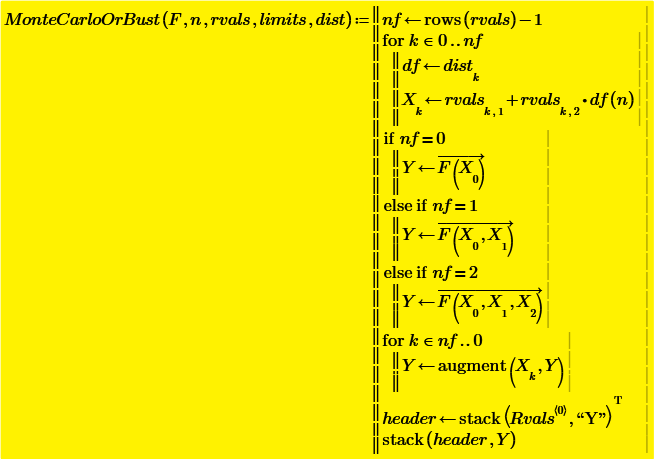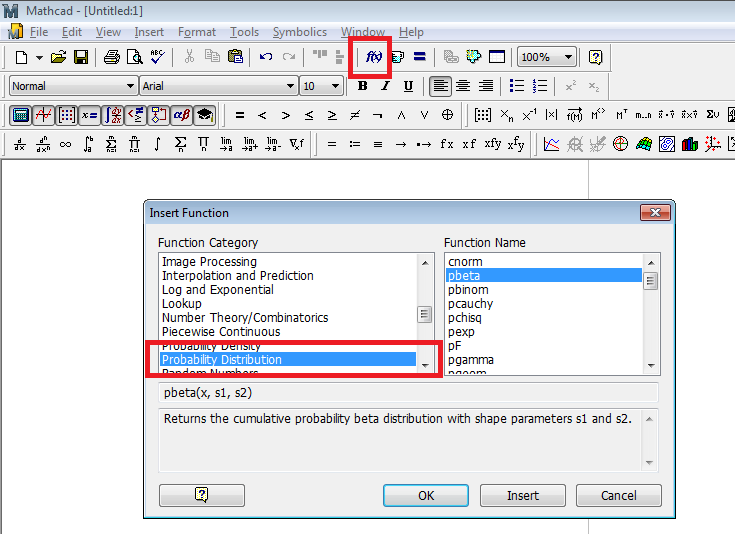Community Tip - Visit the PTCooler (the community lounge) to get to know your fellow community members and check out some of Dale's Friday Humor posts! X
- Subscribe to RSS Feed
- Mark Topic as New
- Mark Topic as Read
- Float this Topic for Current User
- Bookmark
- Subscribe
- Mute
- Printer Friendly Page
Monte carlo Simulation
- Mark as New
- Bookmark
- Subscribe
- Mute
- Subscribe to RSS Feed
- Permalink
- Notify Moderator
Monte carlo Simulation
Hi, I want to know howw can I define a probability distribution function to use it with monte carlo function.
Thanks
Solved! Go to Solution.
- Labels:
-
Other
Accepted Solutions
- Mark as New
- Bookmark
- Subscribe
- Mute
- Subscribe to RSS Feed
- Permalink
- Notify Moderator
Alejandro Jaramillo wrote:
Thank you for your answers, I forgot to explanied that the error apears when I define de vector "dist" for monte carlo function in MATHCAD PRIME 3.1, it says that the vector only can have the name of the distribution function, so I can´t use "rbeta(...)" or anything with arguments.
Ah. I see what you mean. I'm not sure why montecarlo is written the way it is; I would have thought, at first glance, that it would be more useful to allow the user to specify the inverse cumulative function plus necessary arguments.
You get the error you see because you can only use a function of the form F(n), where F(n) is a function that generates n samples from the distribution described by F's underlying distribution functions. The given montecarlo distribution functions, eg Normal, are implementations of their equivalent 'r' functions, eg, Normal(n) is rnorm(n,0,1) and Uniform(n) is runif(n,-6,6).
The Rvals merely scale the variants according to x = mean + stdev * x1, where x1 is a variant generated by the distribution function (eg, Normal or Uniform). This means that if the distribution function has shape parameters, then the 'dist' function must be tailored for those parameters. For example, if you want to use a beta or triangular distribution, you'll have to choose the shape you want (ie, s1 & s2 for beta, and a, b & c for triangular), then write a specific Beta(n) or Triang(n) for these parameters. Eg:
Beta(n):=rbeta(n,s1,s2)
Triang(n):=rtriang(n,a,b,c) [where rtriang is as defined in my example above]
I tried these with montecarlo, using Rvals of mean=0,stdev=1 to give unity scaling, but get a different error: "The function did not evaluate to a real value. It may include a complex value.". I even tried Uniform(n):=runif(n,-6,6), as per the Help page definition, and that gave the same error.
However, ever cloud has a silver lining, and it's not that difficult to write a version of montecarlo that will take the same input arguments and return similar results. It doesn't allow arbitrarily long distribution arrays, but, by using an if..elseif..else structure, it's possible to make this new variant handle up to 5 or so distributions. This is only possible because Prime has dropped the static typing introduced in Mathcad 12 and reverted to Mathcad 11's dynamic typing. Mathcad 12..15 would raise a function type error, because static typing would have to know beforehand (ie, as soon as you've written it not executed it) how many arguments the target function F has.
Stuart

- Mark as New
- Bookmark
- Subscribe
- Mute
- Subscribe to RSS Feed
- Permalink
- Notify Moderator
Mathcad has many defined distribution functions. Read the help files.
- Mark as New
- Bookmark
- Subscribe
- Mute
- Subscribe to RSS Feed
- Permalink
- Notify Moderator
I know Mathcad has Normal, LogNormal, Weibull and Uniform, but I need to include a Triangular and a Beta distribution.
- Mark as New
- Bookmark
- Subscribe
- Mute
- Subscribe to RSS Feed
- Permalink
- Notify Moderator
You can find Beta distribution and many others in "Insert Function" command (in main menu select "Insert" --> "Function" --> "Probability Distribution"):

In attachment you can find an example of working with a Triangular distribution.
- Mark as New
- Bookmark
- Subscribe
- Mute
- Subscribe to RSS Feed
- Permalink
- Notify Moderator
Alejandro Jaramillo wrote:
I know Mathcad has Normal, LogNormal, Weibull and Uniform, but I need to include a Triangular and a Beta distribution.
Here's another variant of the triangular distribution to complemet Vladimir's example. It provides density, cumulative, inverse cumulative and vector functions for the triangular distribution in keeping with Mathcad's other distribution functions.
Stuart

- Mark as New
- Bookmark
- Subscribe
- Mute
- Subscribe to RSS Feed
- Permalink
- Notify Moderator
Stuart,
Thank you for providing this example.
- Mark as New
- Bookmark
- Subscribe
- Mute
- Subscribe to RSS Feed
- Permalink
- Notify Moderator
VladimirN. wrote:
Stuart,
Thank you for providing this example.
Нет проблем , Владимир. I hope it's useful to somebody.
Stuart
- Mark as New
- Bookmark
- Subscribe
- Mute
- Subscribe to RSS Feed
- Permalink
- Notify Moderator
Thank you for your answers, I forgot to explanied that the error apears when I define de vector "dist" for monte carlo function in MATHCAD PRIME 3.1, it says that the vector only can have the name of the distribution function, so I can´t use "rbeta(...)" or anything with arguments.
Thanks
Sorry for my english
- Mark as New
- Bookmark
- Subscribe
- Mute
- Subscribe to RSS Feed
- Permalink
- Notify Moderator
Alejandro Jaramillo wrote:
Thank you for your answers, I forgot to explanied that the error apears when I define de vector "dist" for monte carlo function in MATHCAD PRIME 3.1, it says that the vector only can have the name of the distribution function, so I can´t use "rbeta(...)" or anything with arguments.
Ah. I see what you mean. I'm not sure why montecarlo is written the way it is; I would have thought, at first glance, that it would be more useful to allow the user to specify the inverse cumulative function plus necessary arguments.
You get the error you see because you can only use a function of the form F(n), where F(n) is a function that generates n samples from the distribution described by F's underlying distribution functions. The given montecarlo distribution functions, eg Normal, are implementations of their equivalent 'r' functions, eg, Normal(n) is rnorm(n,0,1) and Uniform(n) is runif(n,-6,6).
The Rvals merely scale the variants according to x = mean + stdev * x1, where x1 is a variant generated by the distribution function (eg, Normal or Uniform). This means that if the distribution function has shape parameters, then the 'dist' function must be tailored for those parameters. For example, if you want to use a beta or triangular distribution, you'll have to choose the shape you want (ie, s1 & s2 for beta, and a, b & c for triangular), then write a specific Beta(n) or Triang(n) for these parameters. Eg:
Beta(n):=rbeta(n,s1,s2)
Triang(n):=rtriang(n,a,b,c) [where rtriang is as defined in my example above]
I tried these with montecarlo, using Rvals of mean=0,stdev=1 to give unity scaling, but get a different error: "The function did not evaluate to a real value. It may include a complex value.". I even tried Uniform(n):=runif(n,-6,6), as per the Help page definition, and that gave the same error.
However, ever cloud has a silver lining, and it's not that difficult to write a version of montecarlo that will take the same input arguments and return similar results. It doesn't allow arbitrarily long distribution arrays, but, by using an if..elseif..else structure, it's possible to make this new variant handle up to 5 or so distributions. This is only possible because Prime has dropped the static typing introduced in Mathcad 12 and reverted to Mathcad 11's dynamic typing. Mathcad 12..15 would raise a function type error, because static typing would have to know beforehand (ie, as soon as you've written it not executed it) how many arguments the target function F has.
Stuart

- Mark as New
- Bookmark
- Subscribe
- Mute
- Subscribe to RSS Feed
- Permalink
- Notify Moderator
Thank you very much, my solution was close to it by creating a function that only depends of (n) but I didn´t create my own Monte Carlo, I will try to include the limits in the function.





